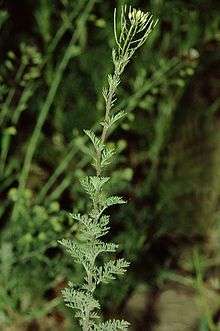Descurainia sophia
| Descurainia sophia | |
|---|---|
 | |
| Scientific classification | |
| Kingdom: | Plantae |
| (unranked): | Angiosperms |
| (unranked): | Eudicots |
| (unranked): | Rosids |
| Order: | Brassicales |
| Family: | Brassicaceae |
| Genus: | Descurainia |
| Species: | D. sophia |
| Binomial name | |
| Descurainia sophia (L.) Webb ex Prantl[1] | |
| Synonyms | |
|
Sisymbrium sophia L. | |
| Wikimedia Commons has media related to Descurainia sophia. |
Descurainia sophia is a member of the mustard family.[1] Common names include flixweed, herb-Sophia and tansy mustard.[2] It reproduces by seeds. Its stem is erect, branched, and 4 to 30 inches high.[3] It was once given to patients suffering from dysentery and called by ancient herbalists Sophia Chirurgorum, "The Wisdom of Surgeons," on account of its healing properties.[4] It is the type species of the genus Descurainia and of the rejected genus Sophia Adans.[5][6]
In Popular Culture
In Iran, the seeds are called khak-e shir (khakshir), and khak-e shir drinks are mostly known as thirst quencher during hot summer days. Based on the traditional treatment in Iran, it is regarded as an effective way to treat pimples, halitosis, and weight loss, all of which can be explained based on the fact that the plant has a number of fatty and aromatic acids such as Lynvyyk acid, Linolenic acid, Oleic acid, Palmitic acid, and stearic acid.[7]
In German, it is called the Sophienkraut and associated with Saint Sophia of Rome, who was invoked against late frosts.[8]
References
- 1 2 "Descurainia sophia (L.) Webb ex Prantl". World Checklist of Selected Plant Families (WCSP). Royal Botanic Gardens, Kew. Retrieved 12 November 2014 – via The Plant List.
- ↑ "Descurainia sophia". Germplasm Resources Information Network (GRIN). Agricultural Research Service (ARS), United States Department of Agriculture (USDA). Retrieved 12 November 2014.
- ↑ Flixweed
- ↑ botanical.com - A Modern Herbal | Mustards
- ↑ Index Nominum Genericorum
- ↑ Tropicos
- ↑ Khake shir (Territory)
- ↑ Ekkart Sauser (1995). "Sophia von Rom". In Bautz, Traugott. Biographisch-Bibliographisches Kirchenlexikon (BBKL) (in German). 10. Herzberg: Bautz. cols. 807–808. ISBN 3-88309-062-X.